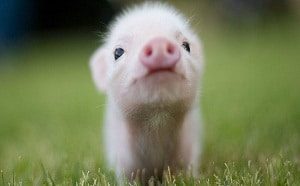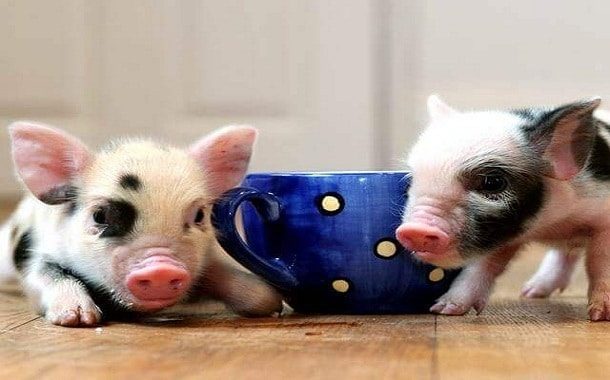How Much Do Teacup Pigs Cost?
Last Updated on December 21, 2023
Written by CPA Alec Pow | Content Reviewed by ![]() CFA Alexander Popinker
CFA Alexander Popinker
Teacup pigs make delightfully quirky pets. But before welcoming one of these mini oinkers home, it’s crucial to understand the full scope of ownership costs. Between purchase fees, supplies, healthcare, and more, monthly expenses quickly add up.
Read on for a detailed cost overview of everything from teacup pig acquisition to lifetime care and maintenance.
How Much Do Teacup Pigs Cost?
Bringing your tiny piggy partner comes with several major upfront investments:
First off, a teacup pig will cost between $50 and $300 if you’re going for a cheap adoption, or $1,200 to $6,000 or more if you’re getting it from a reputable breeder. The cost range will depend on several factors, but more about this below.
Adoption – $50-$300
Want to skip breeder costs? Check local shelters and rescues. Adoption fees help cover veterinarian bills. Ensure your piggy gets a clean bill of health first.
Breeder Purchase – $1,200-$6,000
From specialty breeders, teacup pigs range from $1,200 for basic pets to over $6,000 for prized miniature and micro varieties. Research breeders thoroughly and meet piglets first.
According to NYTeacupPiggies.com, prices range from $500 to $2,500 depending on size and color rarity.
SoCalMiniPigs.com offers teacup pigs for sale that are priced at $600 unless on sale. The website explains that their price is much cheaper to cover costs and keep the business going.
PeeWeePiglets.com lists specific prices for their teacup and mini piglets, such as $350 for Tinky, $300 for Mason, and $350 for Keith.
Initial Supplies – $300-$500
Essentials like beds, bowls, litter boxes, toys, and more will cost around $300+ when starting from scratch. Look for free hand-me-downs to save.
Outdoor Enclosure – $100-$1,000
While teacup pigs stay small, outdoor space lets them root and roam safely. Building a secure yard pen costs $100 to $1,000+ in fencing and materials.
Regular Monthly Teacup Pig Expenses
Once your piglet is settled in, budget for these recurring monthly pet costs:
You might also like our articles about the cost of a finger monkey, pig, or chinchilla.
Food – $20-$60
Quality teacup piglet feed and portion control prevent obesity. Expect to spend $20-$60 monthly.
Grooming – $10-$40
Weekly baths using pig shampoo keep your oinker clean for around $10-$40 per month.
Toys – $10-$50
Mentally stimulating puzzle feeders, “rooting” rugs and tough chew toys prevent boredom. Budget $10-$50 a month for these.
Litter – $10-$40
Replace soiled potty training litter monthly. Alternative outdoor toilet training saves money long-term.
Vet – $0-$300
Annual vet exams are very important to monitor for illness. Specialized pig vets cost more than basic wellness exams.
Insurance – $35-$80
Pet insurance through providers like PetAssure covers surprise piggy medical bills starting at $35 monthly.
Total Average Monthly Cost: $105-$500
Basic costs for a healthy teacup pig average $105-$150 monthly. But if frequent vet visits, prescriptions, or health issues need to be considered, monthly costs could reach $500 or more.
Potential Additional Teacup Pig Expenses
Beyond usual care costs, also prepare for:
House Damage – $50+ – Pigs chew! Shoes, carpets, drywall and more may fall victim to their strong jaws.
Pet Sitting – $20-$50 per day – Few standard boarding facilities accept pigs. Specialized pet sitters cost more.
Emergency Vet – $200+ – Have an emergency fund for unexpected severe illnesses or injuries requiring intensive vet care.
Like any pet, teacup pigs come with both big benefits and challenges to prepare for. By understanding the pros and cons, you can make an informed decision if welcoming one of these special snorting friends makes sense.
Let’s go over what makes miniature pigs delightful yet demanding companions. Here are the biggest advantages and drawbacks to factor into your decision-making process:
Pros of Owning a Teacup Pig
They’re Unbelievably Smart and Trainable
It’s no exaggeration – pigs are extremely intelligent creatures! In fact, research shows pigs can be as smart as chimpanzees and dogs. They possess excellent memories, understand commands quickly, and can creatively problem-solve.
This high mental capacity makes teacup pigs a delight to train. When positive reinforcement techniques are used, most pigs happily learn commands and tricks like sit, spin, and so on. With time and consistency, your mini pig can even master impressive agility courses.
Beyond commands, teacup pigs take well to potty training too. Many can be taught to utilize a litter box indoors and signal at the door when they need outside potty trips. Their trainability makes cleaning up after your pet pig far less messy and demanding.
Teacup Pigs Form Deep Bonds with Owners
In addition to their smarts, mini pigs are highly social and love interaction. They actively seek out time with their favorite humans and often follow owners from room to room waiting to play. Compared to cats or independent hamsters, pet pigs crave your company and affection.
This attachment tendency means teacup pigs bond strongly with owners who snuggle, play, and care for them consistently. Your pig will eagerly greet you after work, beg for belly rubs, and cuddle up on the couch for movie nights. For many owners, this depth of connection and loyalty brings immense joy and comfort.
They Offer Something Unique from Typical Pets
While cats, dogs, fish, and birds have their perks, let’s be honest – they’re pretty ordinary as far as pets go. On the other hand, owning a teacup pig still has a major element of novelty. Even veteran exotic pet owners see pigs as a new adventure.
Your mini pig’s distinctive behaviors like funny vocalizations, ability to learn tricks, and adorable outfits will undoubtedly spark curiosity and conversations during neighborhood walks and park visits. Their uniqueness makes teacup pigs far from boring.
Pigs Stay Smaller than Farm Varieties
The main appeal of a teacup pig over a standard farm hog comes down to their tiny size. Through special breeding, teacup pigs are genetically predisposed to stay small, usually topping out around 55 pounds or less (far smaller than the average 600+ pound farm pig!)
This more manageable miniature size means you don’t need large open pastures or huge feeding capabilities to properly care for a mini pig. Most adapt well to smaller spaces like condos and apartments as long as their exercise needs are met. Still, ensure you choose an ethical specialty breeder that carefully breeds for size.
Teacup Pigs Don’t Shed Much Dander or Hair
For those with allergies or who simply dislike constantly vacuuming up pet hair, teacup pigs offer welcome relief. They only have light hair covering their bodies. And pigs produce considerably lower allergen dander than animals with heavy fur or feathers.
While no pet is 100% non-allergenic for those sensitive to dander or saliva, most find their miniature pigs cause fewer symptoms. This makes these farm animals better tolerated by many owners with pet allergies. Just be sure to bathe your pig weekly to control any odor and shedding.
Cons to Consider Before Getting a Micro or Mini Pig
They Carry a Higher Upfront Purchase Price
There’s no getting around it – teacup pigs are far pricier to purchase initially compared to cats or dogs. Because specialty breeders produce litters intentionally bred smaller through genetics, you can expect to pay $1,000 to $6,000 to acquire your piglet.
Rescues offer cheaper adoption fees but still expect at least a few hundred in costs. Either way, teacup pigs represent a major upfront investment. Make sure you budget accordingly and find an ethical seller.
Ongoing Care Costs Are Also Substantial
In addition to the initial purchase price, raising a teacup pig long-term has high recurring expenses as well. Between specialized veterinary visits, premium feed, toys, and housing modifications, monthly costs easily exceed $100 or more. Unexpected medical issues requiring surgery or medications quickly drive up bills too.
While their smaller size makes care more manageable than farm pigs, these are still far from low-maintenance pets from a financial perspective. Realistically project if your budget sustains 10-15+ years of piggy expenses before committing.
They Love to Chew…On Everything!
Chewing, biting, and rooting come naturally to all pigs as they forage and explore their environment with their snouts. But this innate tendency can spell trouble in your home. Teacup pigs enjoy chewing and digging at shoelaces, carpets, drywall, cabinets – you name it.
To reduce destruction, you must piggy-proof your home by removing tempting items and establishing chewing-friendly zones. Supervision is a must – if bored, your pig will occupy itself by gnawing your possessions. Be prepared with plenty of pig-safe toys to redirect energy.
Pigs Require Specialized Care and Housing
 Compared to walking a dog or cleaning a cat litter box, caring for a teacup pig is a lot more complex. Their specific dietary, exercise, housing, and veterinary needs will take time to learn. For instance, not all standard vets treat pigs. You’ll need access to qualified exotic animal veterinary services.
Compared to walking a dog or cleaning a cat litter box, caring for a teacup pig is a lot more complex. Their specific dietary, exercise, housing, and veterinary needs will take time to learn. For instance, not all standard vets treat pigs. You’ll need access to qualified exotic animal veterinary services.
At a minimum, your pig needs plenty of roaming room, a securely fenced outdoor area for rooting and trailing, hiding spots to destress, and interactive stimulus. Prep work ensures your home accommodates their needs.
They Live 10-15 Years or Longer
With long 12-15-year lifespans, teacup pigs live far longer than rodents like hamsters but also longer than many dog breeds. Even cats average just 12-15 years. Are you ready for an enduring decade-plus commitment to properly care for your piggy?
Many impulse pet purchasers underestimate the long-haul devotion involved with potbellied pigs. Be sure you can provide for their enrichment, exercise, and medical needs well into their senior years.
Their Adult Size Can Vary
Even from specialty teacup pig breeders, that adorable little piglet’s full adult dimensions are somewhat unpredictable. While genetics and careful breeding influence size, some may still naturally grow larger than you bargained for.
Any pig has the potential to reach 100+ pounds. If your pig grows bigger than expected, are you willing and able to accommodate it? Unfortunately, rehoming grown pigs is difficult due to their size and specialized needs. Do your research to find the most responsible specialty breeders with size guarantees.
How to Afford a Teacup Pig on a Budget
While essential care shouldn’t be ignored, you can get creative to save on non-essentials:
- Seek free supplies like beds, bowls, and toys from re-homing owners.
- DIY inexpensive play pens and toys from household items.
- Buy reusable, long-lasting supplies instead of disposable versions.
- Sign up for store loyalty programs and pet product newsletter promos.
- Purchase food and litter in bulk or use auto-ship subscriptions to save.
- Train your piggy to potty outdoors to reduce litter costs.
Final Words
Welcoming home an adorable teacup pig brings tremendous joy mixed with real financial challenges. But their quirky personalities and fierce loyalty make the investment worthwhile for many owners.
Still, take time to realistically weigh if your lifestyle can accommodate a piggy’s care needs and substantial costs before jumping in. With realistic expectations and adequate savings, this unusual pet promises years of special snorts, oinks, and cuddles ahead.


Leave a Reply
Want to join the discussion?Feel free to contribute!